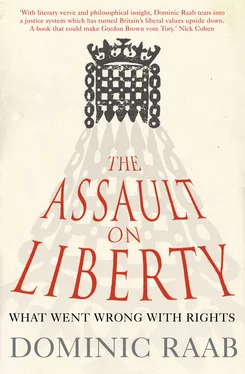What makes the government’s position so alarming is that, while taking repressive action against those airing legitimate opinions, it has at the same time cosseted those preaching vitriol and violence. In 2007, the Dispatches documentary ‘Undercover Mosque’ revealed the homophobic, sexist and intolerant preaching of extremist Muslim clerics at the Green Lane mosque in Birmingham. The documentary showed preachers referring to homosexuals as ‘filthy dogs’, justifying the 7/7 bombings and explicitly calling for the death of those who convert from Islam. West Midlands Police recommended to the Crown Prosecution Service that it consider a prosecution – not against the preachers, but, rather, the filmmakers for allegedly misrepresenting the views of the clerics and undermining community relations. Even when it became clear that there was no evidence to back up this unfounded allegation, police and prosecutors still referred allegations against the programme to Ofcom, the media watchdog. Ofcom threw out the complaint, finding that Channel 4 and Dispatches had produced the documentary accurately and responsibly. Channel 4 and Dispatches responded by suing the police and the CPS for libellously suggesting that the documentary had been selectively edited in order to distort the views of the preachers. The police and CPS were forced to issue a public apology and pay a six-figure sum by way of compensation. The case demonstrates how broad public order powers, coupled with a culture of excessive political correctness, can lead to flagrant lack of respect for legitimate free speech, while simultaneously tolerating fanatical extremism – a naïve approach with dangerous consequences both for our security and our freedom.
In another case, a whistle-blower, Derek Pasquill, disclosed sensitive Foreign and Commonwealth Office (FCO) documents which appeared in newspapers, exposing FCO engagement with extremist Islamic groups, such as the Muslim Brotherhood in Egypt, some of whose members have connections with terrorism. Far from forcing an embarrassed FCO to reconsider its policy on engagement with radical Islamic groups, the government’s reaction to this controversial exposé was to press for a prosecution against Mr Pasquill for breaching the Official Secrets Act. The prosecution’s case collapsed when senior FCO officials admitted that a prosecution could not succeed, because Pasquill’s actions were actually beneficial – encouraging a constructive debate on a serious matter of public interest.
It is remarkable, too, how, having stifled peaceful protest and closed down legitimate debate in the most harmless of circumstances, government policy has been so tolerant of those who stir up extremism and violence. In February 2006, demonstrations were held in London against the publication of Danish cartoons depicting the Prophet Mohammed in a manner that many Muslims found offensive and insensitive. Around five hundred protesters were involved in the protests that followed, and a small number of people carried placards calling on Muslims to ‘bomb’ the US and Denmark, ‘massacre those who insult Islam’ and urging ‘whoever insults a prophet, kill him’. Four protesters were prosecuted and convicted of soliciting murder in July 2007. As David Perry QC, the prosecuting barrister argued, the words used were plainly criminal: ‘If you shout out, “Bomb, bomb Denmark; bomb, bomb USA”, there is no doubt about what you intend your audience to understand…The prosecution case is that the defendant was clearly encouraging people to commit murder – terrorist killing. This was not simply a demonstration about cartoons. It was a recruitment for terror.’
The court agreed and convicted the accused. Notwithstanding the criminal prosecutions, it is difficult to understand the police decision to allow protesters to proceed with their demonstration in the first place, carrying banners that openly incited violence. The Metropolitan Police said they had allowed the protest to continue for fear of public disorder – itself an astonishing sop to extremism, at the expense of law enforcement. But they then waited a further six weeks before making any arrests. In contrast, the government was quick to condemn the Danish cartoons, which, though offensive to many Muslims, did not incite violence.
Конец ознакомительного фрагмента.
Текст предоставлен ООО «ЛитРес».
Прочитайте эту книгу целиком, купив полную легальную версию на ЛитРес.
Безопасно оплатить книгу можно банковской картой Visa, MasterCard, Maestro, со счета мобильного телефона, с платежного терминала, в салоне МТС или Связной, через PayPal, WebMoney, Яндекс.Деньги, QIWI Кошелек, бонусными картами или другим удобным Вам способом.












